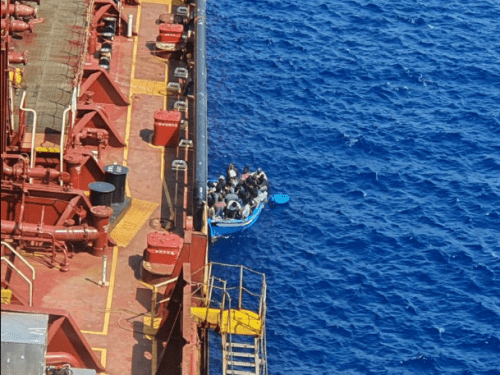
The International Chamber of Shipping (ICS), the International Organization for Migration (IOM) and the United Nations High Commission for Refugees (UNHCR)are calling for the immediate disembarkation of 27 rescued people trapped onboard a cargo ship.
The distraught group, including one child and a pregnant woman, have now been onboard the Maersk Etienne for more than one month.
Governments have been refusing permission for the ship’s Master to disembark the migrants and refugees who fled Libya, in contravention of international law. The ship’s crew have been sharing food, water and blankets with those rescued. They are however not trained or able to provide medical assistance to those who need it. A commercial vessel is not a safe environment for these vulnerable people and they must be immediately brought to a safe port.
In a letter to the organization’s Secretary General, the International Chamber of Shipping has called on the International Maritime Organization to urgently intervene and “send a clear message that States must ensure that Maritime Search and Rescue incidents are resolved in accordance with the letter and spirit of international law.”
International law and maritime conventions place clear obligations on ships and coastal States to ensure people in distress are rescued and promptly disembarked in a place of safety. The Maersk Etienne fulfilled its responsibilities, but now finds itself in a diplomatic game of pass the parcel.
“The absence of a clear, safe, and predictable disembarkation mechanism for people rescued in the Mediterranean, continues to pose avoidable risk to life. IOM and UNHCR have long called on states to move away from the current ad hoc approach and establish a scheme whereby coastal states take equal responsibility in providing a port of safety, followed by a show of solidarity from other EU member states,” IOM Director General António Vitorino, said.
Secretary General of the International Chamber of Shipping (ICS), Guy Platten, said, “The conditions are rapidly deteriorating onboard, and we can no longer sit by while governments ignore the plight of these people. This is not the first time that this has happened, and we need governments to live up to their obligations. Time is running out and the responsibility for these people’s safety and security rests squarely with government ministers. This is not COVID related; this is a humanitarian issue pure and simple.”
“The shipping industry takes its legal and humanitarian obligations to assist people in distress at sea extremely seriously, and has worked hard to ensure that ships are as prepared as they can be when presented with the prospect of large-scale rescues at sea. However, merchant vessels are not designed or equipped for this purpose, and States need to play their part,” said Platten.
“Rescue at sea is a basic humanitarian imperative”, said Filippo Grandi, UN High Commissioner for Refugees. “The Maersk Etienne has fulfilled its maritime obligations and prevented further death in the Mediterranean. The EU and its Member States must now do their part to complete this life saving rescue by allowing those rescued to be disembarked, and should also show some solidarity amongst states, particularly through an effective and predictable relocation mechanism.”
The Maersk Etienne is the third incident this year in which a merchant vessel has been stranded caring for people rescued at sea. In May, the Marina was delayed for six days with some 80 rescued people on board before being able to disembark, while in July, the Talia took four days out of its scheduled journey to care for 50 people who were finally allowed to disembark in a place of safety after 4 days. This latest incident represents a significant escalation of the situation.